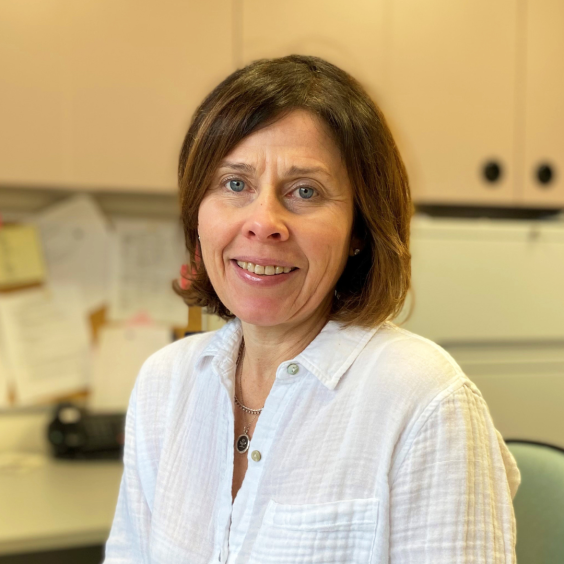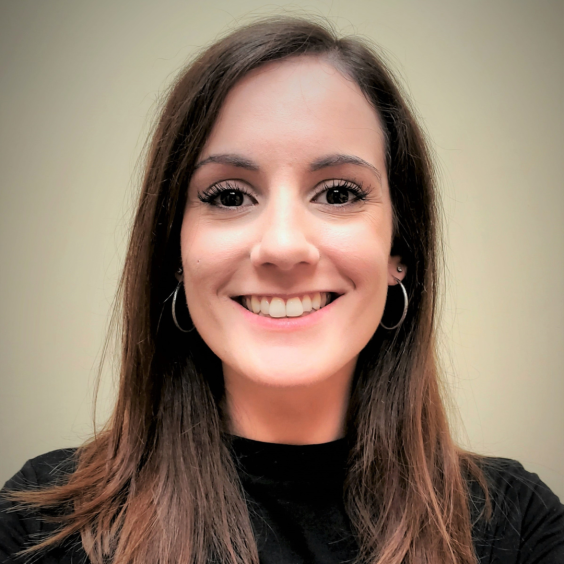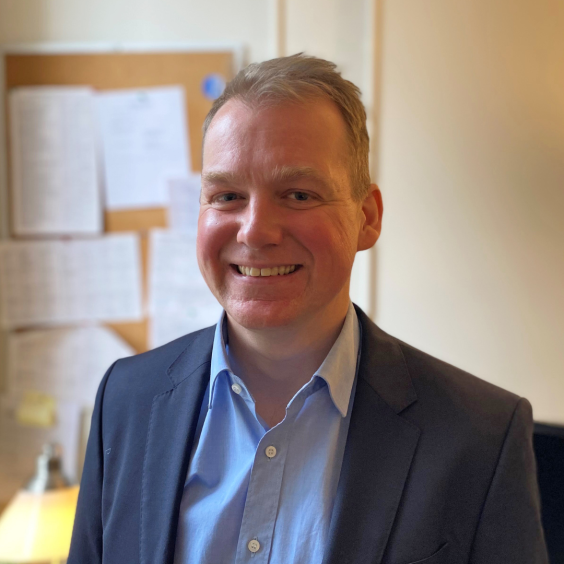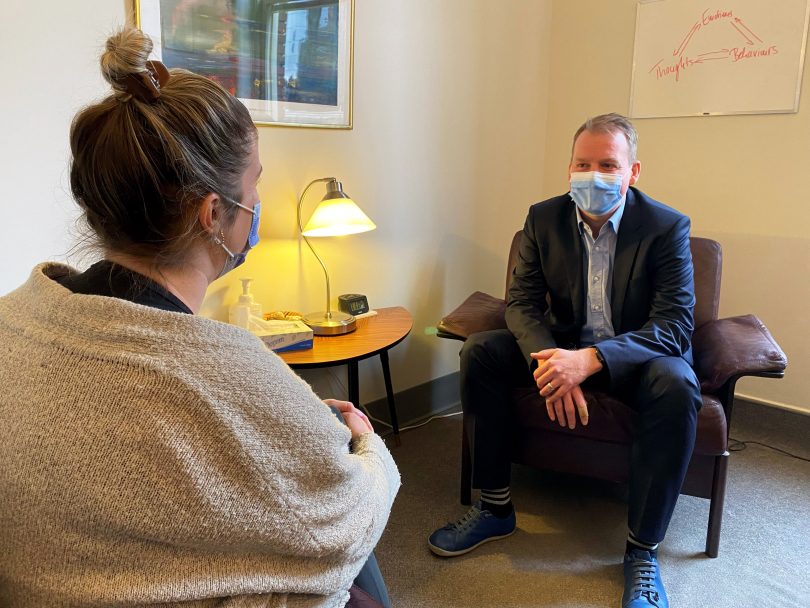February is Psychology Month in Canada, a time to celebrate the contributions of psychologists and to show Canadians how psychology works to help people and communities.
Psychologists are regulated health professionals who are trained in understanding how we behave, think and feel.
At Providence Health Care, the Psychology Team consists of 14 psychologists and one psychometrist. They provide assessment, treatment and consultation services to patients in the areas of mental health, elder care, HIV, cardiology, hematology, and cystic fibrosis.
Psychologists work with patients to help optimize self-management, cope with chronic disease, and deal with stressors.
In addition to providing psychological services, they also conduct clinical research, participate in program development and program evaluation, and provide teaching and supervision.
Get to know six psychologists who work across Providence’s sites and services.

Dr. Karin Christensen, Psychologist (Neuropsychology) at Mount Saint Joseph Hospital (Older Adult Clinic and inpatient units)
How long have you been with Providence? 12 years
Describe your job in one sentence: I offer a lens on people’s cognitive and emotional functioning to help health teams with diagnosis and treatment/life-choice planning.
What do you like most about what you do? I really enjoy solving clinical puzzles, collaborating with everyone on the care teams, and sharing important moments with patients and their families.
What do you wish people knew about being a psychologist? We are not taught to read minds in graduate school! But we are trained to be expert observers of behaviour 🙂

Dr. Aiko Yamamoto, Neuropsychologist at St. Paul’s Hospital
How long have you been with Providence? 18 years
Describe your job in one sentence: I assess cognitive functioning (e.g., memory, attention, language skills).
What do you like most about what you do? It’s always interesting! I get to meet people referred from several different hospital sites (e.g., mental health, eldercare, Foundry, John Ruedy Clinic) with a variety of health conditions and different types of cognitive concerns.
What do you wish people knew about being a psychologist? We don’t just provide therapy! In hospital settings, we also conduct psychological and neuropsychological assessments, provide supervision to psychology residents, and conduct research including program evaluation.

Dr. Sarah Cockell, Psychologist at St. Paul’s Hospital (Heart Transplant Program)
How long have you been with Providence? I have been employed by Providence since 2001, but started my time with the organization in 1994 when I was hired by Dr Laird Birmingham and Dr. Elliot Goldner as a research student. I am forever grateful to them both for the warm, inspiring welcome.
Describe your job in one sentence: I provide psychological services to cardiac patients and their families, consultation with health providers who work with cardiac patients, and supervision to graduate students.
What do you like most about what you do? My job provides a space to be curious, kind, creative and extremely helpful – in my opinion, that’s an amazing way to spend most of my working hours!
What do you wish people knew about being a psychologist? We are highly skilled and could be used more as consultants to health care providers who want to improve their relationships and effectiveness with patients, which in turn could improve outcomes.

Dr. Sheena Miao, Psychologist at Foundry Vancouver-Granville
How long have you been with Providence? Three years
Describe your job in one sentence: I provide psychological assessment and treatment to youth and young adults between the age of 12-24 at an integrated community clinic.
What do you like most about what you do? I love those little moments when you feel that you truly connect with a client and are helping them to make a difference in their world – it’s so rewarding and energizing. I also enjoy working alongside of colleagues who are all so passionate about doing the same.
What do you wish people knew about being a psychologist? That we do also feel the emotional load of doing this work and we certainly are not immune to burnout and compassion fatigue. However, in order for us to stick around and do the job that we love so much, we really commit to self-care and work-life balance throughout our career to make it sustainable.

Dr. Rachael Neal, Clinical Psychologist at St. Paul’s Hospital (Heart Transplant Program)
How long have you been with Providence? I’ve been with Providence for five months, and worked previously within Vancouver Coastal Health.
Describe your job in one sentence: As part of a dynamic multidisciplinary team, my role includes meeting with patients as part of their routine assessment for heart transplant; providing therapy support to those who are being considered for, or who have undergone transplant; and consulting with team members around how we can best support our patients’ care.
What do you like most about what you do? My favourite aspect of my work is when I’m able to support someone to start making the changes they want to see in their life – collaboratively identifying strategies that work for them, navigating through the ups and downs of the change or adjustment process, and building up confidence in new patterns that they can carry forward.
What do you wish people knew about being a psychologist? Sometimes folks are surprised to find psychologists working in acute health settings, but psychologists bring a unique skill set that can benefit patients as well as our teams. In addition to our expertise in implementing evidence-based interventions with folks from diverse backgrounds, we have specialized training in assessment and diagnosis, program development and evaluation, research, and supervision. No two weeks are exactly alike!

Dr. Theo Elfers, Professional Practice Leader for Psychology at Providence Health Care; Registered Psychologist
How long have you been with Providence? I have been with Providence for nine years. Wow, is it already this long? I was lucky to be offered a position at the end of my residency training in 2014 and have stayed since.
Describe your job in one sentence: I support the role and practice of psychology at Providence and work as a clinician in the Provincial Adult Specialized Eating Disorders Program (PATSEDP), where I provide individual and group psychotherapy.
What do you like most about what you do? There is so much. I love most how much variety my role has to offer. I can collaborate on high-level program changes to support our staff in delivering the best possible care. The next minute, I may lead a patient group on managing negative thoughts or sit with a patient who courageously faces their worst fear. Also, I love that psychology, against the common belief, is not just talking but that I get to teach and actively practice with my patients evidence-based strategies that work. Next door, a dear psychology colleague, Dr. Josie Geller, is collecting data on our program to give us feedback if any new changes positively affect our patients’ welfare. How cool is that!? Last, I feel so lucky that we have such an excellent team of psychologists here at Providence, each so knowledgeable in their area and, of course, I treasure working with my colleagues at the PATSEDP team. They are the best!
What do you wish people knew about being a psychologist? First and foremost, I would like to emphasize that access to mental health care is part of every good medical care and that psychology has a lot to contribute in this area. I can’t think of a single chronic health condition with no mental health component. Even standard medical care interventions can benefit from psychological science. For example, a psychological study found that patients’ pain response during a painful procedure was soothed by the simple act of the patients’ partners holding their hands.





